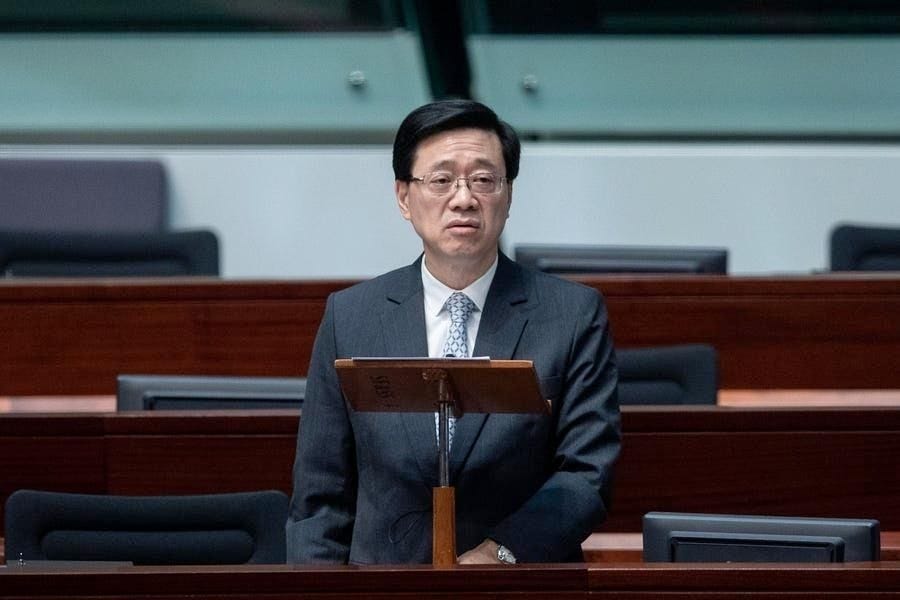
The decision to disqualify a top lawyer from representing the jailed Catholic publisher Jimmy Lai will rest with Hong Kong’s chief political authority and not the courts, the Beijing government has decided.
Hong Kong’s chief executive John Lee Ka-chiu, also a Catholic, appealed Lai’s choice of lawyer to the mainland government last year after his objections were thrown out by local courts.
According to reports in local media, the standing committee of the National People’s Congress in Beijing has issued a legal clarification, stating that the chief executive and local Committee for Safeguarding National Security have the authority to interpret relevant law to decide whom defendants can choose to represent them in national security cases. The decision was first reported on Jan. 1, but it is unclear when it was formally issued.
Lai has been fighting through the Hong Kong legal system to be allowed his preferred lawyer to represent him.
Although two courts have upheld Lai’s right to be represented by a top UK lawyer, Hong Kong’s chief executive Lee appealed to the mainland government last year to prevent Luke Owen, a UK national, from representing Lai.
Because of its historical ties to the UK and UK law, British lawyers and judges have long served in the Hong Kong legal system. Lee has sought to block Owen’s appointment, arguing that foreign nationals should not be allowed to take part in national security trials.
That objection was dismissed by Hong Kong’s High Court, a decision subsequently upheld by the Court of Appeal. But, after Lee appealed to Beijing, the case was adjourned last month until September in the expectation that the central government would not return a decision quickly.
Now, the central standing committee has said the final decision now rests with Lee and his administration under the “one country, two systems” principle meant to govern Hong Kong in the decades after it was handed back to China by the UK in 1997.
The new legal clarification means that political executives, not judges, have the final say on which lawyers are qualified to appear in court in national security cases. Lee is now widely expected to formally reject Owen’s appointment, forcing Lai to find another lawyer.
The decision is a clear win for Lee, who came to office earlier this year. He was elected in May by Hong Kong’s specially constituted electoral college after running unopposed as the sole candidate approved by the mainland.
Those changes announced by Lee are likely directly linked to the trial of Cardinal Joseph Zen, the emeritus bishop of Hong Kong, who was convicted by a local court last month for failing to officially register a fund helping pro-democracy protesters of which he was a trustee.
While running for office, Lee credited his Jesuit education for his drive to “help society as a whole.”
Jimmy Lai, the Catholic pro-democracy advocate and newspaper publisher, has been in prison for more than two years and faces life in jail if convicted of national security crimes. He has repeatedly cited his Catholic faith as a motivating and sustaining force in his ongoing trials.
After he was convicted of unlawful assembly for attending a 2019 prayer vigil and helping to organize other banned public events in Hong Kong, Lai was given a two-and-a-half year sentence. Last week, he was handed a further six month jail term, after he was found guilty of fraud in relation to the subletting of office space by his publishing company — charges his supporters have called a pretext for shuttering his former newspaper Apple Daily, and keeping Lai in prison.
In addition to his previous convictions, Lai also faces charges under the National Security Law, brought in by the mainland government in 2020 in response to the wave of pro-democracy protests which swept Hong Kong the previous year.
Lai is accused of encouraging foreign governments to impose sanctions on Hong Kong and Chinese officials over the suppression of pro-democracy demonstrations.
When the National Security Law was imposed in 2020, Lai called it the “death knell” of rule of law in Hong Kong. Soon after he was arrested and jailed on national security charges, he called his imprisonment “the pinnacle of [his] life.”




